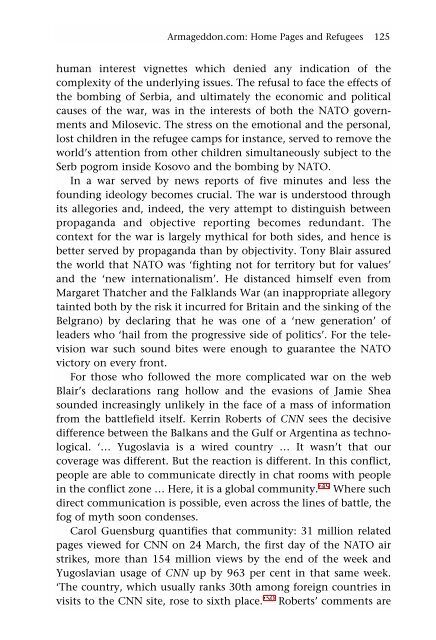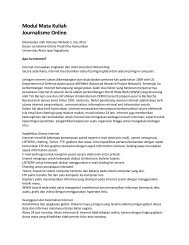Online Journalism - Ayo Menulis FISIP UAJY
Online Journalism - Ayo Menulis FISIP UAJY
Online Journalism - Ayo Menulis FISIP UAJY
Create successful ePaper yourself
Turn your PDF publications into a flip-book with our unique Google optimized e-Paper software.
Armageddon.com: Home Pages and Refugees 125<br />
human interest vignettes which denied any indication of the<br />
complexity of the underlying issues. The refusal to face the effects of<br />
the bombing of Serbia, and ultimately the economic and political<br />
causes of the war, was in the interests of both the NATO governments<br />
and Milosevic. The stress on the emotional and the personal,<br />
lost children in the refugee camps for instance, served to remove the<br />
world’s attention from other children simultaneously subject to the<br />
Serb pogrom inside Kosovo and the bombing by NATO.<br />
In a war served by news reports of five minutes and less the<br />
founding ideology becomes crucial. The war is understood through<br />
its allegories and, indeed, the very attempt to distinguish between<br />
propaganda and objective reporting becomes redundant. The<br />
context for the war is largely mythical for both sides, and hence is<br />
better served by propaganda than by objectivity. Tony Blair assured<br />
the world that NATO was ‘fighting not for territory but for values’<br />
and the ‘new internationalism’. He distanced himself even from<br />
Margaret Thatcher and the Falklands War (an inappropriate allegory<br />
tainted both by the risk it incurred for Britain and the sinking of the<br />
Belgrano) by declaring that he was one of a ‘new generation’ of<br />
leaders who ‘hail from the progressive side of politics’. For the television<br />
war such sound bites were enough to guarantee the NATO<br />
victory on every front.<br />
For those who followed the more complicated war on the web<br />
Blair’s declarations rang hollow and the evasions of Jamie Shea<br />
sounded increasingly unlikely in the face of a mass of information<br />
from the battlefield itself. Kerrin Roberts of CNN sees the decisive<br />
difference between the Balkans and the Gulf or Argentina as technological.<br />
‘… Yugoslavia is a wired country … It wasn’t that our<br />
coverage was different. But the reaction is different. In this conflict,<br />
people are able to communicate directly in chat rooms with people<br />
in the conflict zone … Here, it is a global community.’ 49 Where such<br />
direct communication is possible, even across the lines of battle, the<br />
fog of myth soon condenses.<br />
Carol Guensburg quantifies that community: 31 million related<br />
pages viewed for CNN on 24 March, the first day of the NATO air<br />
strikes, more than 154 million views by the end of the week and<br />
Yugoslavian usage of CNN up by 963 per cent in that same week.<br />
‘The country, which usually ranks 30th among foreign countries in<br />
visits to the CNN site, rose to sixth place.’ 50 Roberts’ comments are
















